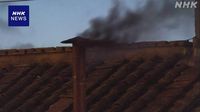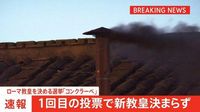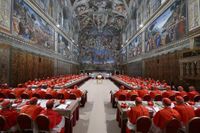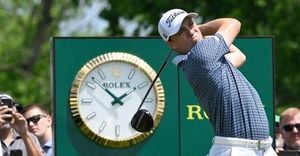The conclave to elect a new Pope of the Roman Catholic Church commenced on May 7, 2025, in the Vatican's Sistine Chapel, but the first ballot did not result in a decision. Black smoke emerged from the chapel's chimney, indicating that no candidate had secured the required two-thirds majority of votes.
Participating in the conclave are 133 cardinals, who are eligible to be elected as the next Pope. This election comes in the wake of the death of Pope Francis, who passed away last month, leaving a significant void in the leadership of the world's 1.4 billion Catholics.
According to reports, the first voting session occurred after a Mass held at St. Peter's Basilica, where cardinals gathered to pray before entering the conclave. After the initial vote, the cardinals were unable to agree on a successor, leading to the signal of black smoke, which traditionally indicates that no decision has been reached.
The voting process will continue on May 8, 2025, with the possibility of up to four ballots being conducted each day until a new Pope is elected. Following established traditions, the ballots will be burned twice daily, with the smoke serving as a visual cue to the faithful gathered in St. Peter's Square. Black smoke signifies that no candidate has been chosen, while white smoke will indicate the successful election of a new Pope.
As the conclave progresses, the cardinals will reconvene to cast their votes again. The Vatican has stated that from May 8 onward, they will hold two voting sessions in the morning and two in the afternoon.
Of the 135 cardinals under the age of 80 eligible to vote, two did not participate due to health reasons, including two Japanese cardinals. The conclave is governed by strict rules of secrecy, ensuring that the voting process remains confidential.
The anticipation surrounding the conclave is palpable, as the new Pope will play a crucial role in guiding the Catholic Church through contemporary challenges. This includes addressing issues such as the church's response to social justice, climate change, and internal reforms.
In the days leading up to the conclave, many have speculated about potential candidates and their respective views on these pressing matters. The election of a new Pope is not just a religious event; it holds significant implications for millions of Catholics worldwide.
As the cardinals prepare for the next round of voting, the world watches closely, awaiting the emergence of the next leader of the Catholic Church. The process, steeped in tradition and solemnity, reflects the deep-rooted significance of this moment in the church's history.
With the first ballot concluded without a decision, the stage is set for further deliberations among the cardinals. The hope remains that a consensus will be reached soon, ushering in a new era of leadership for the Catholic Church.
The conclave, which is a unique blend of spirituality and governance, showcases the intricate balance of faith and decision-making in one of the world's oldest religious institutions. As such, it continues to attract global attention, underscoring the importance of the Catholic Church in contemporary society.






